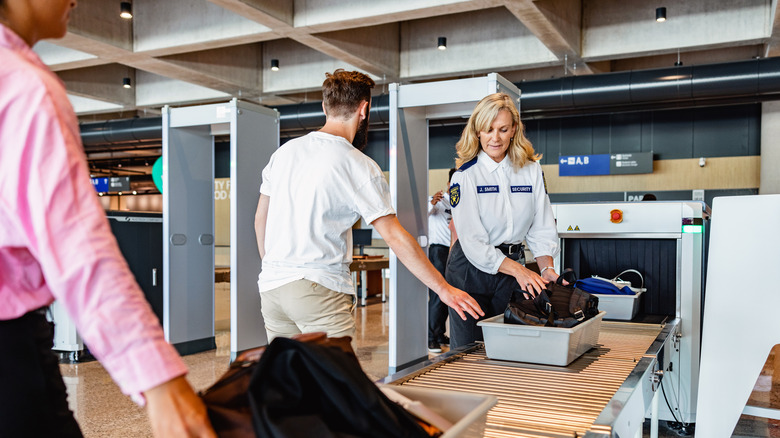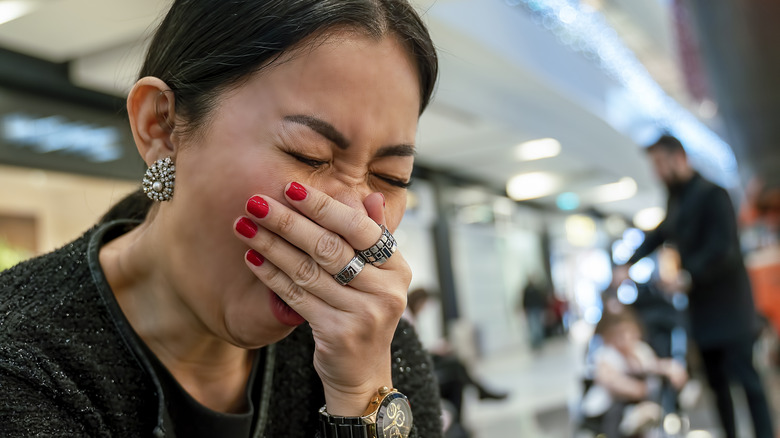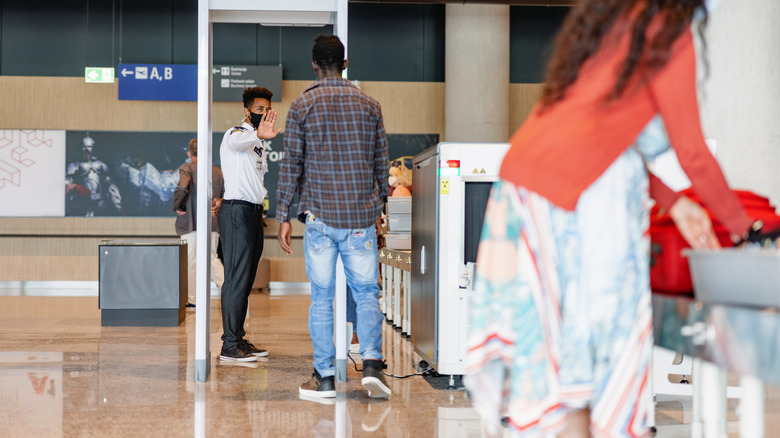The Involuntary Reflex TSA Considers A Warning Behavior And Could Get You Flagged
Whether it's because of a red-eye flight or severe jet lag, we've all felt sleepy at the airport at one point or another. But even if travel-related drowsiness is normal, excessive yawning in the security line is seen as a red flag by Transportation Security Administration (TSA) agents. Security personnel look for exaggerated yawning when observing travelers as part of its Screening of Passengers by Observation Techniques, or SPOT, program, according to a document obtained by The Intercept.
Yep, TSA isn't just closely examining the contents of your carry-on luggage — they're keeping a close eye on your actions and movements, including involuntary reflexes. A spokesperson for the agency told The Intercept, "Behavior detection, which is just one element of the Transportation Security Administration's (TSA) efforts to mitigate threats against the traveling public, is vital to TSA's layered approach to deter, detect and disrupt individuals who pose a threat to aviation."
If you tend to be sleepy while traveling — or if you simply find the long security lines to be a bore — rest assured that yawning alone likely won't get you into any trouble with security staff. "No single behavior alone will cause a traveler to be referred to additional screening or will result in a call to a law enforcement officer (LEO)," the spokesperson explained.
Why is yawning on TSA's checklist?
The document used by TSA doesn't offer many details explaining why excessive yawning is part of the SPOT criteria, and some have argued that the program doesn't make much sense anyway. Before The Intercept published the items listed in the document, the ACLU sued TSA over its dubious SPOT procedures. "The TSA has insisted on keeping documents about SPOT secret, but the agency can't hide the fact that there's no evidence the program works," Hugh Handeyside, staff attorney with the ACLU National Security Project, stated in a press release. Besides being ineffective, the organization argued that SPOT encouraged racial and religious profiling of passengers.
For yawning specifically, the reflex is often an innocent sign of fatigue or, rarely, a health condition such as epilepsy or multiple sclerosis, according to Healthline. So why would security officers consider it a signal of suspicious activity or ill intentions? It might have to do with another potential cause of yawning: stress. "Nervous people will definitely yawn more," Robert Provine, a University of Maryland, Baltimore County, neuroscientist and author of "Curious Behavior: Yawning, Laughing, Hiccupping, and Beyond," told Wired. According to Provine, yawning is an example of a displacement activity that might serve to soothe the body during heightened arousal. Therefore, yawn attacks at the airport might indicate anxiety (as one might feel if they had something dangerous in their luggage, for instance) in some people rather than sleepiness.
Other features TSA looks for
The SPOT checklist published by The Intercept includes several other behaviors and personal characteristics that could get you flagged at the airport, with the majority separated into three categories: stress factors, fear factors, and deception factors. Along with exaggerated yawning, other involuntary behaviors such as blinking fast, gulping, skin flushing, and leg shaking are all considered stress factors, according to the document.
Clothing and bag styles are also listed in the SPOT standards. For instance, TSA officers are instructed to be on the lookout for bulging garments or clothing that doesn't suit the environment. They also watch for people who don't appear to be together in the security line but are wearing similar outfits or carrying similar bags. Heavy bags, too, are a red flag, per the document, so you might want to think twice before loading up your hand luggage with too many in-flight snacks and books.
Finally, the behaviors most likely to trigger additional screening are the deception factors, including wearing a disguise, appearing confused, or disobeying TSA instructions. Unsurprisingly, travelers are also subject to further screening if carrying weapons, drugs, large amounts of cash, or other prohibited items. Follow all rules when packing for your flight and remember to stay relaxed, and you can generally expect to get through airport security without being flagged.


